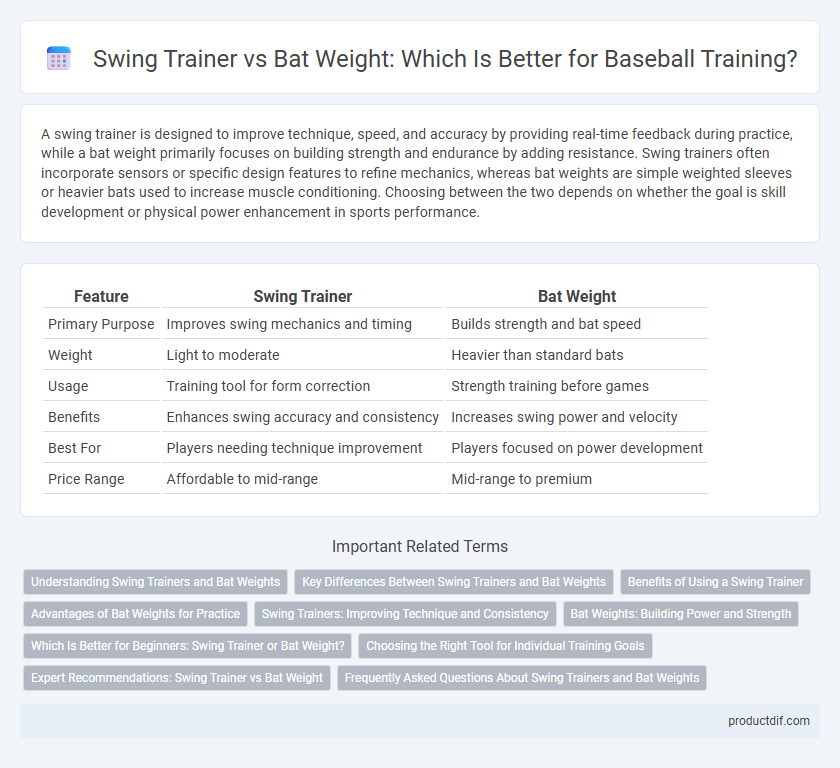A swing trainer is designed to improve technique, speed, and accuracy by providing real-time feedback during practice, while a bat weight primarily focuses on building strength and endurance by adding resistance. Swing trainers often incorporate sensors or specific design features to refine mechanics, whereas bat weights are simple weighted sleeves or heavier bats used to increase muscle conditioning. Choosing between the two depends on whether the goal is skill development or physical power enhancement in sports performance.
Table of Comparison
| Feature | Swing Trainer | Bat Weight |
|---|---|---|
| Primary Purpose | Improves swing mechanics and timing | Builds strength and bat speed |
| Weight | Light to moderate | Heavier than standard bats |
| Usage | Training tool for form correction | Strength training before games |
| Benefits | Enhances swing accuracy and consistency | Increases swing power and velocity |
| Best For | Players needing technique improvement | Players focused on power development |
| Price Range | Affordable to mid-range | Mid-range to premium |
Understanding Swing Trainers and Bat Weights
Swing trainers enhance bat speed and swing mechanics by providing resistance or weighted feedback during practice, promoting muscle memory and improved hand-eye coordination. Bat weights are heavier versions of regular bats used to build strength and increase swing power, helping players develop faster swing speeds when switching back to their game bats. Understanding the distinct roles of swing trainers and bat weights is crucial for selecting the right tool to improve performance in baseball or softball training.
Key Differences Between Swing Trainers and Bat Weights
Swing trainers primarily improve swing mechanics and increase bat speed by emphasizing proper form and timing, while bat weights focus on building muscle strength and endurance specific to swinging. Swing trainers are often lighter and designed to promote a smooth, controlled motion, whereas bat weights add resistance to enhance power and overall swing force. Choosing between the two depends on whether the athlete's goal is skill refinement or physical conditioning for hitting.
Benefits of Using a Swing Trainer
A swing trainer enhances muscle memory and improves swing mechanics by providing consistent feedback during practice, which leads to better bat control and faster swing speed. Unlike traditional bat weights that primarily add resistance, swing trainers promote proper form and timing, reducing the risk of injury and optimizing overall performance. Incorporating a swing trainer into regular training routines results in more accurate, powerful hits and increased confidence at the plate.
Advantages of Bat Weights for Practice
Bat weights enhance muscle strength and improve swing speed by adding resistance during practice, leading to more powerful hits. They promote better swing mechanics and timing by simulating game-like conditions without altering form. Using bat weights regularly helps develop endurance, reducing fatigue during actual gameplay.
Swing Trainers: Improving Technique and Consistency
Swing trainers enhance batting technique by promoting proper swing mechanics and improving muscle memory through repetitive, controlled practice. Unlike bat weights, swing trainers provide resistance without altering swing speed, allowing for more consistent and accurate motion. This targeted training tool helps athletes develop greater bat control, timing, and overall performance in the batter's box.
Bat Weights: Building Power and Strength
Bat weights are essential tools for building power and strength in baseball and softball players by increasing muscle endurance and improving swing mechanics. Using weighted bats regularly enhances bat speed and core stability, which directly translates to more powerful, controlled hits during games. Compared to swing trainers, bat weights provide dynamic resistance that closely mimics actual game conditions, promoting functional strength gains and better muscle recruitment.
Which Is Better for Beginners: Swing Trainer or Bat Weight?
Swing trainers provide beginners with improved swing mechanics, better timing, and increased bat speed by offering balanced resistance without altering natural swing motion. Bat weights add muscle strength and endurance but can negatively impact swing form if overused, leading to slower adjustments during actual gameplay. For beginners, a swing trainer is generally better for developing proper technique and consistent performance.
Choosing the Right Tool for Individual Training Goals
Selecting the appropriate training aid depends on specific skill development objectives; a swing trainer enhances bat speed and mechanics through repetitive motion practice, while a bat weight builds strength and power by increasing resistance during swings. Athletes aiming to improve swing accuracy and timing benefit from the controlled feedback provided by swing trainers, whereas those focused on increasing bat speed and muscle endurance find weighted bats more advantageous. Tailoring the choice between swing trainers and bat weights aligns with individual training goals to maximize performance gains effectively.
Expert Recommendations: Swing Trainer vs Bat Weight
Experts recommend swing trainers for improving swing mechanics and developing muscle memory, as they typically offer better control and feedback during practice. Bat weights, often heavier than standard bats, increase strength and power but may risk ingraining poor swing habits if used improperly. Integrating both tools strategically can enhance overall batting performance by balancing technique refinement and strength building.
Frequently Asked Questions About Swing Trainers and Bat Weights
Swing trainers and bat weights serve different purposes in baseball and softball training; swing trainers focus on improving swing mechanics and speed, while bat weights primarily build strength and bat control. Common questions include how each tool impacts swing speed, the risks of overuse injuries, and the recommended duration for training sessions. Understanding these differences helps athletes choose the appropriate equipment to enhance performance and reduce injury risk.
Swing trainer vs Bat weight Infographic

 productdif.com
productdif.com